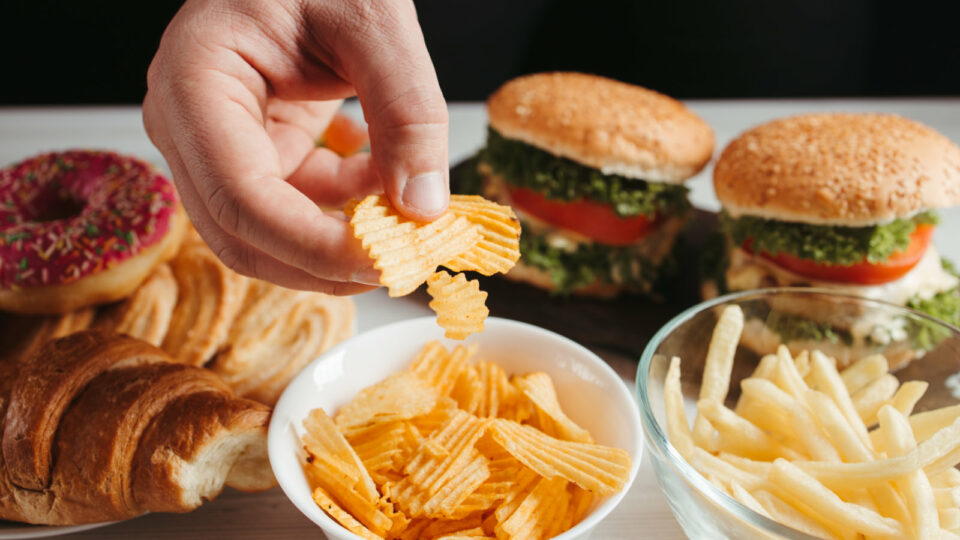Every runner dreams of shaving seconds off their personal best, pushing their limits to achieve new milestones. While training regimes and recovery techniques are often the focus, there’s a crucial component that can significantly impact your performance: your diet.
The truth is, if you want to run faster, it might be time to reevaluate what’s on your plate, especially when it comes to processed foods.
Table of Contents
The Impact of Processed Foods on Athletic Performance
Processed foods are those that have been altered from their natural state for convenience, shelf life, or taste. Examples include packaged snacks, sugary cereals, and fast food. These foods are often high in added sugars, unhealthy fats, and preservatives, while lacking essential nutrients.
For athletes, this can mean decreased energy levels, longer recovery times, and an overall dip in performance. Studies have shown a direct correlation between a diet high in processed foods and reduced athletic capabilities.
What is Processed Food?
Processed food refers to any food that has been altered from its natural state, either for safety reasons or convenience. The processing can include canning, freezing, refrigeration, dehydration, and aseptic processing. Foods are processed to enhance their taste, extend their shelf life, and, in some cases, improve nutritional value.
However, not all processed foods are created equal. They range from minimally processed items like bagged spinach or roasted nuts to heavily processed foods such as frozen meals and soft drinks. Understanding the spectrum of processed foods can help in making healthier food choices.
Minimally Processed Foods
These are foods that have been slightly altered for preservation but still closely resemble their natural state:
- Pre-cut vegetables and fruits
- Roasted nuts
- Frozen fruits and vegetables
- Canned beans (with no added salt or sugar)
- Freshly made breads
Moderately Processed Foods
Moderately processed foods have ingredients added for flavor and texture enhancement:
- Cheese
- Yogurt (with added fruit or flavors)
- Canned fruit in syrup
- Simple breads and pastas made from refined white flour
Heavily Processed Foods
These foods are further from their original form and often contain added sugars, salts, preservatives, and artificial flavors:
- Breakfast cereals
- Chips and snacks
- Microwave meals
- Soft drinks and flavored beverages
- Processed meats (bacon, sausages, hot dogs)
- Ice cream and desserts
Not Commonly Known Processed Foods
Some processed foods might not be immediately recognised as such because they can be deceptive in their appearance or are traditionally not viewed as processed:
- Store-bought salad dressings and sauces
- Flavored nuts and seeds (often coated in sugar or salt)
- Dried fruit (which can contain added sugar)
- Pre-made smoothies (which may have added sugars and preservatives)
- Energy bars and protein bars (often have added sugars and fillers)
- Bottled teas and coffee drinks (frequently contain high levels of added sugars)
- Vegan and vegetarian meat substitutes (can be highly processed with additives to mimic flavors and textures of meat)
Understanding the range of processed foods helps in making informed dietary choices. While not all processed foods are unhealthy, focusing on whole foods and minimally processed options is generally recommended for optimal health.
Nutritional Needs for Runners
Runners have specific nutritional needs that are essential to fuel their performance and aid in recovery. Understanding and meeting these needs is crucial for anyone looking to improve their running speed, endurance, and overall health.
Here’s a closer look at the key nutrients runners should focus on:
1. Carbohydrates
Carbohydrates are the primary fuel source for runners, especially those engaging in long-distance or high-intensity workouts. They are stored in the muscles and liver as glycogen, which is used for energy during running.
Whole grains, fruits, vegetables, and legumes are excellent sources of complex carbohydrates that provide a steady release of energy, helping to maintain endurance and prevent fatigue.
2. Proteins
Proteins are vital for the repair and growth of muscle tissue damaged during running. A sufficient protein intake helps with recovery, strengthens the muscles, and improves overall performance.
Runners should aim to include a source of lean protein in every meal and snack, focusing on foods like chicken, fish, tofu, legumes, and dairy products.
3. Fats
Healthy fats are another important energy source for long-distance runners, supporting sustained energy release over extended periods of exercise. Fats also play a key role in absorbing fat-soluble vitamins and protecting vital organs. Sources of healthy fats include avocados, nuts, seeds, and olive oil.
4. Vitamins and Minerals
A wide range of vitamins and minerals support metabolic processes that are critical for running performance and recovery. For example, iron is essential for oxygen transport in the blood, calcium and vitamin D are crucial for bone health, and potassium and sodium help maintain electrolyte balance and prevent cramping.
A varied diet rich in fruits, vegetables, lean proteins, and whole grains typically provides a good balance of these essential nutrients.
5. Hydration
Hydration is paramount for runners, as even slight dehydration can significantly impact performance. Water is essential for regulating body temperature, transporting nutrients, and preventing injuries.
Runners should drink water throughout the day and adjust their intake based on the duration and intensity of their runs, as well as environmental conditions.

Benefits of Eliminating Processed Foods
Eliminating processed foods from your diet can have profound effects on your running performance as well as your overall health. Here are some key benefits:
- Enhanced Energy Levels: Whole foods provide sustained energy, helping you avoid the spikes and crashes often associated with high-sugar processed foods.
- Improved Digestion: Natural, fiber-rich foods improve gut health, leading to better nutrient absorption and less bloating or digestive discomfort.
- Quicker Recovery: The antioxidants found in whole foods can reduce muscle inflammation, aiding in faster recovery after runs.
- Weight Management: Whole foods are more satisfying and nutrient-dense, helping to control appetite and support healthy weight management.
- Reduced Health Risks: A diet low in processed foods is linked to a lower risk of health issues such as heart disease, diabetes, and high blood pressure.
- Better Sleep Quality: Nutrient-rich diets support better sleep patterns, which is crucial for recovery and performance.
How to Transition to a Whole Food Diet
Transitioning to a whole food diet requires a shift in shopping, cooking, and eating habits. Here are practical steps to make the change:
- Start Slowly: Gradually replace processed foods with whole food alternatives rather than making an abrupt change.
- Plan Your Meals: Planning helps prevent last-minute reliance on processed foods. Prepare a weekly menu and shop accordingly.
- Read Labels: Become familiar with reading nutrition labels to identify processed foods high in added sugars, unhealthy fats, and preservatives.
- Cook at Home: Cooking at home gives you control over ingredients and helps you avoid processed components.
- Focus on Variety: Incorporate a wide range of fruits, vegetables, whole grains, lean proteins, and healthy fats to ensure nutritional balance.
- Hydrate with Water: Replace sugary beverages and alcohol with water, herbal teas, or infused water to stay hydrated and reduce calorie intake.
- Seek Whole Food Snacks: Opt for fruits, nuts, seeds, or yogurt instead of packaged snacks for healthier alternatives.
- Be Prepared for Challenges: Keep whole food snacks on hand to avoid temptation when you’re hungry, and find whole food-friendly restaurants for dining out.
By adopting these strategies, you can successfully transition to a whole food diet, reaping the benefits for both your running performance and your overall health.
Challenges and How to Overcome Them
Challenge 1: Cravings for Sugar and Processed Foods
- Insight: Research indicates that high-sugar, processed foods can create a cycle of cravings due to their impact on blood sugar levels and brain chemistry.
- Solution: Gradually reduce sugar intake to lessen cravings over time. Incorporating foods high in protein and healthy fats can help stabilize blood sugar levels and reduce the urge for sugary snacks.
Challenge 2: Convenience of Processed Foods
- Insight: The convenience of processed foods is a significant barrier to adopting a whole food diet, especially for those with busy lifestyles.
- Solution: Meal prepping and planning can mitigate this challenge. Dedicate time each week to prepare whole food meals and snacks in advance, ensuring healthy options are always accessible.
Challenge 3: Social and Cultural Pressures
- Insight: Social events and cultural norms often revolve around food choices that may not align with a whole food diet, posing a challenge to adherence.
- Solution: Finding social support or a community with similar dietary goals can provide encouragement and accountability. Additionally, learning to navigate social settings by choosing whole food options or eating beforehand can help maintain dietary choices.
Challenge 4: Perceived Cost of Whole Foods
- Insight: The perception that whole foods are more expensive than processed options can deter individuals from making dietary changes.
- Solution: Cost-effective strategies, such as buying in-season produce, opting for frozen fruits and vegetables, and purchasing bulk grains and legumes, can make whole foods more affordable.
Challenge 5: Lack of Knowledge and Resources
- Insight: Uncertainty about how to prepare whole foods or create balanced meals can be a barrier to change.
- Solution: Utilising resources like cookbooks, online tutorials, and nutrition workshops can enhance cooking skills and nutritional knowledge, making it easier to incorporate whole foods into daily meals.
Embracing Whole Foods
Many runners have seen remarkable improvements in their performance after cutting out processed foods. From amateur enthusiasts to professional athletes, the stories of increased speed, better endurance, and personal bests abound, providing both inspiration and proof that diet plays a pivotal role in athletic performance.
The link between diet and running performance is undeniable. By choosing to eliminate processed foods from your diet, you’re not just investing in your athletic performance; you’re also embracing a healthier lifestyle that will benefit you in the long run.
So, take a step towards better health and faster running times by rethinking your diet. Your body—and your stopwatch—will thank you.
Are there any processed foods that can be beneficial for athletes?
Some minimally processed foods like yogurt or whole grain bread can be beneficial, offering convenience without sacrificing nutritional value.
How can athletes minimise the impact of processed foods on performance?
Athletes can minimise impact by prioritising whole foods, staying hydrated, and planning meals to ensure they receive adequate nutrition.
Why do some athletes thrive on processed food?
Some athletes may thrive on processed foods due to high-calorie needs and quick energy release. Processed foods can provide an immediate energy boost and are convenient for athletes with hectic schedules. However, for optimal performance and health, a balanced diet with minimally processed foods is recommended.





